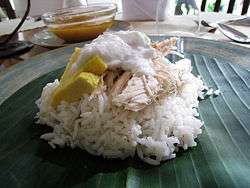Nasi liwet
|
Nasi liwet rice dish in rich coconut milk, chicken and egg. | |
| Course | Main course |
|---|---|
| Place of origin | Indonesia |
| Region or state | Solo, Central Java |
| Creator | Javanese |
| Serving temperature | Hot |
| Main ingredients | Rice cooked in rich coconut milk surrounded with side dishes |
|
| |
Nasi liwet is a succulent rice dish cooked in coconut milk, chicken broth and spices, from Solo, Central Java, Indonesia.[1] Common steamed rice is usually cooked in water, but nasi liwet is rice cooked in coconut milk, chicken broth, salam leaves and lemongrass, thus giving the rice a rich, aromatic and succulent taste.[2] Nasi liwet is a traditional Javanese way of cooking rice in coconut milk.
Serving
Nasi liwet is topped with a slice of omelette, shredded chicken that had also been cooked in coconut milk and a spoonful of a thick aromatic coconut cream called kumut.[1] Served alongside nasi liwet is opor ayam (a delicate chicken in a mild white coconut milk based sauce scented with galangal and lime leaves), telur pindang (eggs boiled slowly with spices), tempeh and labu siam (chayote) as the vegetable.[2]
Traditionally, the pan used for cooking was made of clay. The taste and aroma is generally better if it is cooked on a wood fire, but different regions have different ways of preparing it. Traditionally, it is served on a banana leaf or teak leaf. Frequently, people prefer teak leaves to plates, because of the natural fragrance of the leaf. Nasi liwet complements (side dishes) always consist of coconut milk.
Popularity and variants
In Solo, nasi liwet is usually eaten for breakfast, but also a popular choice for lunch or supper. In Keprabon subdistrict, Surakarta, nasi liwet is only served for supper at the nighttime. Similar rice-coconut milk dishes can be found in other parts of Indonesia, such as nasi uduk Betawi, nasi gurih Aceh, and neighboring nasi lemak from Malaysia.
See also
References
- 1 2 I Made Asdhiana (July 19, 2011). "Nasi Liwet Gurih Dijamin Ketagihan" (in Indonesian). Kompas.com. Retrieved August 19, 2014.
- 1 2 Janet DeNeefe (June 5, 2010). "To Stir With Love: Zara or 'nasi liwet' at Soekarno-Hatta?". The Jakarta Post. Retrieved August 19, 2014.
